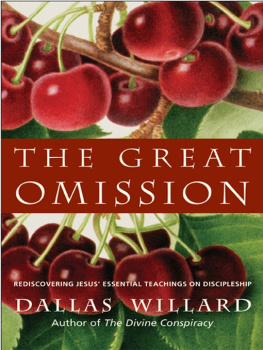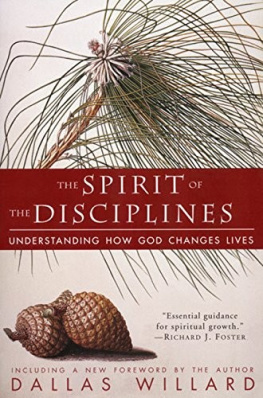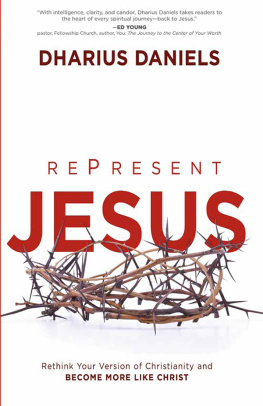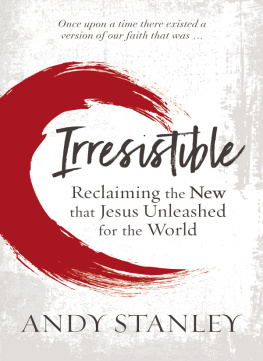For Larissa Raphael Heatley,
the apple of her Grandpas eye
and a beautiful example of
how to gently love people
into the kingdom of God.
CONTENTS
Chapter One
BEGINNING TO THINK FOR CHRIST
Chapter Two
THE NEW TESTAMENT CHARTER ON APOLOGETICS
Chapter Three
BIBLICAL APOLOGETICS
Chapter Four
FAITH AND REASON
Chapter Five
COMMUNICATION BETWEEN GOD AND HUMANITY
Chapter Six
THE PROBLEM OF PAIN AND EVIL
Chapter Seven
LIVING AND ACTING WITH GOD
What are the hard questions that smother faith?
DALLAS WILLARD
The question above comes from a conversation I had with my father, Dallas Willard, about this book. Answering hard questions is what he wanted the book to do. In other discussions, he articulated the spirit he wanted it to have: Gentleness: Apologetics in the Manner of Jesus. Not a gentleness marked by passivity, but a gentleness aglow with shoulder-to-shoulder journeying together over steep hills and through dark valleys. He wanted this book to help people wrestle with common doubts and answer some of the hard questions, allowing more room for the Spirit to advance their faith.
Gentle was a word frequently used to describe my father; he had a gentleness that seemed to come from his many years in the light and easy yoke of Christ. Is gentleness an absence of power or a power born through the Spirit and found in wisdom? Matthew 12:20 says Jesus would not even break a bruised reed or quench a smoldering wick, and yet his gentleness launched a worldwide revolution. In many ways, Jesuss impact seems to be not in spite of his gentleness, but because of it.
Today apologetics has become something of a cage match revolving around proofs of Gods existence and involvement in the world. It has become a harsh battleground for the intelligent design-versus-Darwinism debate and other hot-button religion-versus-science arguments. Whats lost in todays apologetics is to gently and lovingly addresseven welcomethe honest doubts and questions that burden believers faith.
But the wisdom from above is first pure, then peaceable, gentle, willing to yield, full of mercy and good fruits, without a trace of partiality or hypocrisy. (James 3:17)
In the same way that The Divine Conspiracy addressed discipleship as the hole in our conception of the gospel Jesus preached, my father and I hoped this book would help return the field of apologetics to its wise and gentle roots.
This book began as a four-part series of talks given by my father in 1990 at Grace Church in Los Alamitos, California. As I listened to the cassette tapes a few years ago, I was impressed with the uniqueness of this teachingparticularly regarding the manner with which we should approach apologetics. I asked my dad if he would consider letting me transcribe the talks, so that they could be published as a book. He immediately agreed, with the stipulation that he would make additions to the text to be sure that all the important topics were included.
Before we were able to work on those additional topics, my father began struggling with health issues and was eventually diagnosed with cancer. For many months he told me, Dont do anything with the book yet. Well work on it when Im feeling better. At the time of his passing, I still just had the list of additions he wanted to make, with various notes on specific topics.
Thankfully, he left us with papers and recordings that covered everything on the list. The Grace Church series provided significant content, forming the outline and progression of the book (you can listen to the audio version at www.dwillard.org), while notes from a similar series presented at Los Angeles Baptist College and notes for a course on Biblical Apologetics at the Simon Greenleaf School of Law provided excellent reference material to expand on that teaching. A few of my fathers papers and articles written for other occasions filled in some of his additional topics. This includes a very important paper entitled Pain, the Existence of God, and Related Problems, which is the primary source for the chapter on evil.
I am particularly indebted to the late Frank Pastore, of KKLA Radio in Los Angeles, and John Ortberg, of Menlo Park Presbyterian Church, both of whom interviewed Dallas on numerous occasions and asked the hard questions about life and faith. Segments from recordings of those interviews provided additional content on specific topics throughout the book.
In bringing these pieces together, I felt like a tailor who has been blessed with a bolt of beautiful cloth and a perfect pattern. The fabric and pattern come entirely from Dallas; only the stitching is mine. My prayer is that I have sewn this together in such a way that the stitching doesnt show and that my fathers thoughts and ideas are all that is seen. May this book help us do as he prayed: To be simple, humble, and thoughtful as we listen to others and help them come to faith in the One who has given us life.
Rebecca Willard Heatley
June 2014
When most people who are familiar with it hear the word apologetics, they likely associate it with words like argument, evidence, reason, or defense. But few would think to add gentle or gentleness to the list.
That is because the word apologetics came to us from the Greek legal system, where one makes ones defense against the prosecutors charges. That is not the ideal context for gentleness. But the apostle Paul and other New Testament writers adapted this term, so that apologetics came to describe Christian attempts to defend or explain the faith to others. And this is how the church has come to use the term.
For example, since the four Gospels were written to make the case for who Jesus was and what he accomplished and taught, their authors are called apologists, as are those today who specialize in defending Christianity against its critics. Since the time of the great debates surrounding the rise of science and rationalism and the corollary attacks on the churchs commitment to the supernatural, apologetics has become increasingly preoccupied with intellectual debates and arguments.
Now, in principle, there is nothing wrong with this. Since apologetics is involved with ideas, intellectual claims, and reasoning, it is fitting for apologists to engage in intellectual debates and arguments. However, as we will see in this book, given we are seeking to do apologetics in the manner of Jesus, what is not fitting is for apologists to engage in debates and arguments with an antagonizing, arrogant spirit. Indeed, the best way to make the intellectual aspects of apologetics more effective is to combine them with a gentle spirit and kind presentation.
When we do the work of apologetics, we do it as disciples of Jesusand therefore we are to do it in the manner in which he would do it. This means, above all, that we do it to help people, and especially those who want to be helped. That is how all of Jesuss work is characterized in scripture. Apologetics is a helping ministry.
The picture presented in the context of 1 Peter 3:8-17 is that of disciples who are devoted to promoting what is good, but who are being persecuted for it. Their response, as Jesus had taught them, was to rejoice and be glad (Matt. 5:12). This led those looking on to inquire how the disciples could be joyous and hopeful in such circumstances. The question would, of course, be inevitable in an angry, hopeless, and joyless world. So the disciples were charged by Peter: Be ready to make your defense to anyone who demands from you an accounting for the hope that is in you; yet do it with gentleness and reverence. Keep your conscience clear (1 Pet. 3:1516).













